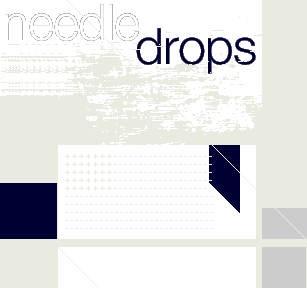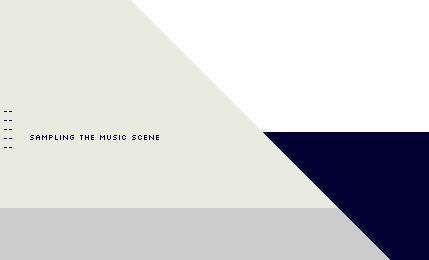


++ Contact Philip Sherburne ++
++ Recently ++
Tuesday, November 29, 2005 = The Stooges Unearthed (Again)
Tuesday, November 8, 2005 = Documenting Beulah And DCFC
Tuesday, November 1, 2005 = Out-Of-Control Rock 'N' Roll Is Alive And Well
Tuesday, October 25, 2005 = Just In Time For Halloween
Monday, October 3, 2005 = The Dandyesque Raunch Of Louis XI
Monday, August 15, 2005 = The Empire Blues
Tuesday, August 9, 2005 = David Howie's Sónar Diary
Monday, July 25, 2005 = Hot Sounds For Summertime
Monday, June 27, 2005 = Overcoming Writer's Block At Sónar 2005
Monday, June 4, 2005 = Cool New Sounds To Download Or Stream
++ Needle Drops Archives ++
View full list of Needle Drops articles...
|
|
 |
Friday, January 31, 2003
++ Rediscovering Techno
++ Call it the curse of the digital generation, but there's no
separating ourselves from our tools, despite the ever-proliferating
range of options designed to allow us to express ourselves in ways
that are ostensibly pure, immediate, and untrammeled by technology.
I'm reminded of this every time I forsake the keyboard for pen and
paper. My handwriting has never been any great shakes, as any of my
grade school teachers could readily attest. But the atrophied scrawl
that slides across the page suggests a strange and troubling
devolution that stands in stark contrast to whatever evolutionary
gains I may have made by linking my thought processes with the
"higher levels of abstraction" offered by digital cut-and-paste
methodologies.
This is hardly an idle observation. If anything, it's an excuse for
the lateness and comparative brevity of this week's column. You see,
I've spent a good part of the week switching computers. Sometime
around the end of 2002 I seem to have entered into a technological
black hole: my DSL went out, my mobile started misbehaving, the mouse
button on my laptop's trackpad came unsprung, one of my turntables
broke. You name it: if it had an LED or an A/C adapter, it revolted.
The final straw was returning home from Chile with a hard drive full
of MUTEK photos and no way to get them out of my laptop, given that
pesky "Operating System Not Found" message that flashed across the
screen every time I tried to reboot. (In retrospect, that may have
something to do with the somewhat forceful manner in which I
attempted to coax the mouse button back to life, but let's not split
hairs — it was nobody's fault, OK?) And so, with the restless
finickiness with which I swap favorite genres every six months or so,
I decided to sever a decade-long relationship with a certain
monopolistic operating system in favor of the peppy (albeit cultish)
appeal of its spunky competitor.
++ "Switching is easy," I read on a promotional Web site, and for the
most part it has been, despite wrenching my fingers into strange
contortions as I unlearn my habitual keystrokes, and figuring out how
to make the delete key erase in either direction. Transferring files
from the old box has proven a trickier issue: I've gone through about
a Volkswagen's worth of aluminum — well, a Cooper Mini, at least
— as I've burned CD-R after CD-R of backup data that magically
fails to appear on my new, blue desktop. All of this effort, though,
has its unexpected payoff: it reminds us that these machines around
which we wrap so much of our waking time are far from transparent,
and anything but natural, despite the best efforts of the interface
designers. A minor epiphany, perhaps, but worth noting all the same:
the more intuitive the interface, the more insidiously it structures
our interactions not only with it, but with our content and
ourselves. That was the takeaway from a half-hour of wrangling with
my new email program in the attempt to get it to insert quoted text
below, and not above, my own reply. (I failed.)
It would, of course, be a truism from beyond the banal to note that
electronic music is a product of its tools. To note the two bookends
of the current history of techno, we've heard again and again how the
farty misfiring of the Roland TB-303 gave birth to acid house, and
how glitch electronica is a response to the hidden failures in
software and hardware. But the dialectic is worth bearing in mind, if
only because techno seems to be mutating again, this time in response
to new applications that allow musicians to mutate loops on the fly,
lending software-based performers an unprecedented degree of
spontaneity. Ricardo Villalobos, Dandy Jack and Atom Heart used
Ableton Live, an application designed around this functionality, as
the basis of their blistering trio set at last May's MUTEK; with
Luciano added to the lineup, they pulled out a similar improv session
in Chile last month. And while I'm not an expert in the software, I
suspect you can hear it at work behind recent releases from
Villalobos, Dandy Jack, and others in the Perlon camp: their tracky,
minimalist workouts seem to mutate more than ever, corkscrewing
through a field of flux, turning beats into blank space and back, the
way Escher's birds collide in a checkerboard of flight.
++ While we're on the topic of switching, I seem to have switched
back to techno, after a brief hiatus away from all things
four-to-the-floor. I've always been a bit restless about genres, and
I seem to rotate my favorites every six months or so. But I'd drifted
away from techno for a while; I hadn't heard anything new in the
boom-tick template, and I wondered if minimal techno was burning out.
Maybe it's the MUTEK effect — hanging out with a bunch of
Montrealers, Germans, and Chileans will do this to you — but
since returning from Chile, all I've wanted to listen to is techno,
the jitterier the better. (Of course, there's no better music to lift
you out of a high-tech funk, if only because no genre feels more
mechanically, machinically deterministic than techno.) In part I've
been going back to my own roots in the genre — the dark,
overdriven acid from the Netherlands' RA-X (released on former EBM
label Kk), experimental tweakery from Vibert & Simmonds' Weirs
LP (Rephlex), Dan Bell's seminal DBX tracks. I played three of Bell's
tracks out the other night, all in a row, and something about his
haywire hardwiring struck a nerve, because three people mentioned it
after the show. San Francisco's dance music community hasn't had a
solid techno scene in years, caught up as it's been in deep house,
drum 'n' bass, and the bouncement offshoots of garage and broken
beat. But perhaps people are ready to strip down to kick drums and
sine grind again?
I hope so, because techno is far from dead, despite my willingness to
write it off a few months back. It might sound obvious, even
painfully so, but how much you take away from music like this depends
on how much you put into it. Not so long ago, I was convinced that
minimal techno had finally hit its last cul-de-sac, tricked onto a
merry-go-round of endless, whooshing oom-pahs. But I'm finding
records that were right under my nose, all along. Andy Vaz's fourth
Sounds Variation 12-inch is far beyond anything he's done before,
lacing dense, confused polyrhythms and squiggles with tight,
floor-ready rhythms. Far from the abstractedness of the initial
Sounds Variation experiments, one track is so housey, at least
underneath the surface, as to suggest a more fraught Luomo.
Also on Background (parent label to Sounds Variation), I've
discovered the not-very-memorably-named Dave Miller, whose two recent
singles sat unnoticed next to my turntables for far too long. He's
got Akufen's Todd Edwards cutup thing down pat, and in places he uses
it more effectively than his mentor. He reminds me a bit of Dettinger
in the way that all his sounds seem run through a sieve, bottled,
frozen, and sprayed through an atomizer. His rhythms, too — from
the Kompakt triplets to the headstrong, skipping garage touches
— are as squirrelly and inventive as anything out there, from
Soft Pink Truth to Perlon.
++ I'll admit to being a bit puzzled as to my conversion back to
techno; I'm not sure why I'm ready to hear the grain and the detail
now that I wasn't before. Two months ago, I put on Dave Miller and
all I could hear was theme; now there's nothing but variation upon
variation upon variation, as he folds motif after motif from classic
techno and house into an origami flipbook. Who's to say why I was
ready to come back to the fold. Maybe it took a bad tech-luck month
to make me appreciate the sound of machines again. Maybe I was just
ready to switch.
|
| |
|